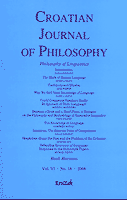Persuasion: The Practical Face of Logic
Persuasion: The Practical Face of Logic
Author(s): Katarzyna BudzynskaSubject(s): Philosophy
Published by: KruZak
Summary/Abstract: The objective of this paper is to show how methods rooted in formal logic may be used to analyze socially important processes of persuasion. A formal approach to the theory of persuasion enables us to thoroughly research issues crucial in everyday life such as: how we argue, why we quarrel, where we are efficient in persuasion, when do we win a negotiation, how we influence others’ decisions, and the kinds of argumentative strategies that are apt to yield more accurate beliefs for all parties involved. I concentrate on three aspects of persuasion practice: nature, success and cognitive value of argumentation process. From a logical perspective, I understand argumentation as reasoning which, after initiation through the opponent’s disagreement, is deployed by the proponent in order to persuade the audience to believe his thesis. Furthermore, I attempt to determine the ways in which we succeed in persuading others. Lastly, I try to specify when an argument is cognitively valuable and when it is reliable, in the sense that it helps us to track the truth. In order to analyze these matters, I investigate argumentation on two independent levels. The subjective level of people’s beliefs is the essential foundation of all persuasion – every time we aim to make the audience believe our opinions and/or change their decisions. The second level is the objective field of truthfulness, where we consider whether a given argumentation will lead us to true or false conclusions.
Journal: Croatian Journal of Philosophy
- Issue Year: VI/2006
- Issue No: 17
- Page Range: 343-362
- Page Count: 20
- Language: English
- Content File-PDF

